On Stage: Heaven and Hell: The Passenger
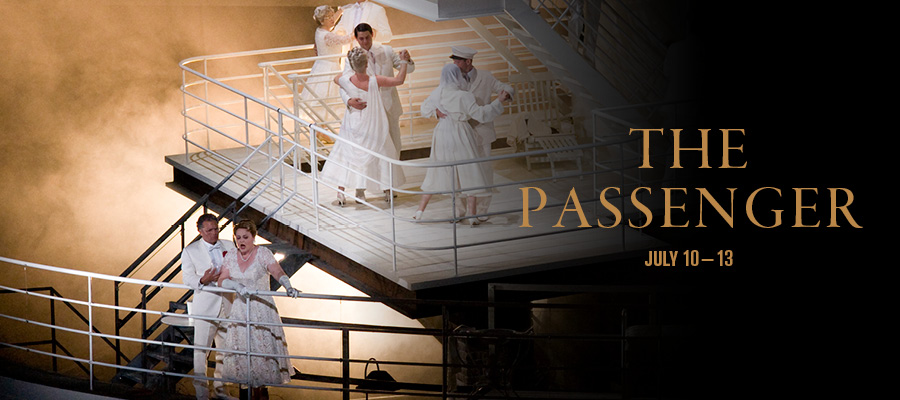
The Passenger
An opera by the late Mieczyslaw Weinberg based on a radio play by Zofia Posmysz, libretto by Alexander Medvedev.
As part of New York City’s Lincoln Center festival, the opera was performed by the Houston Grand Opera Orchestra, conducted by Patrick Summers, staged at the Park Avenue Armory, a grand venue.
The Passenger is about heaven and hell. In heaven, one is aboard a ship bound for Brazil. Passengers walk the deck, drink, dance. All is white: the people, their clothes, the band, their instruments. All is pure until it is divulged … Walter is a German diplomat who is going to Brazil with his wife to take a post. A new life, a new world. It is the early 1960s. His wife, Liese sees a veiled woman walking the deck and she recoils. She is forced to finally reveal to her husband that she had been an S.S. Overseer at Auschwitz. The veiled woman was Marta, a Polish prisoner in her barracks whom she had sent to “the black wall, ” her death.
Now, the perfect vacation, second honeymoon and change of homeland is followed by a cloud. If the woman is indeed Marta, Liese and Walter’s lives will fall apart–they have begun to already. The poisonous past is percolating upward: below the deck is Auschwitz, its blackness, smoke and ashes seeping skyward with the vaporized dead. Is Marta real or an apparition? Is Liese’s terror her guilt haunting her?
Liese: That was our duty, those were the orders from our beloved Führer!
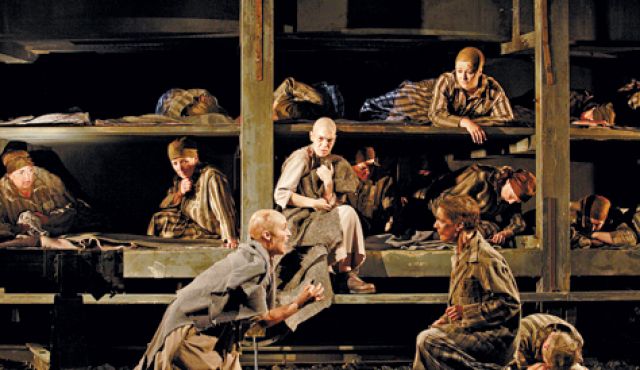 World’s collide and unfold. The scenes go back and forth in time providing revelation after revelation of pain and loss, horror and disbelief. While the dancers waltz above, there is brutality below.
World’s collide and unfold. The scenes go back and forth in time providing revelation after revelation of pain and loss, horror and disbelief. While the dancers waltz above, there is brutality below.
(Chorus)
Concentration camp, that’s what they call you.
Oswiezim! (Auschwitz) But a prisoner may be granted his freedom.
From a camp one hopes to return home.
But the gates of Auschwitz only open inwards.
Oswiezim!
_________________________________________________________________
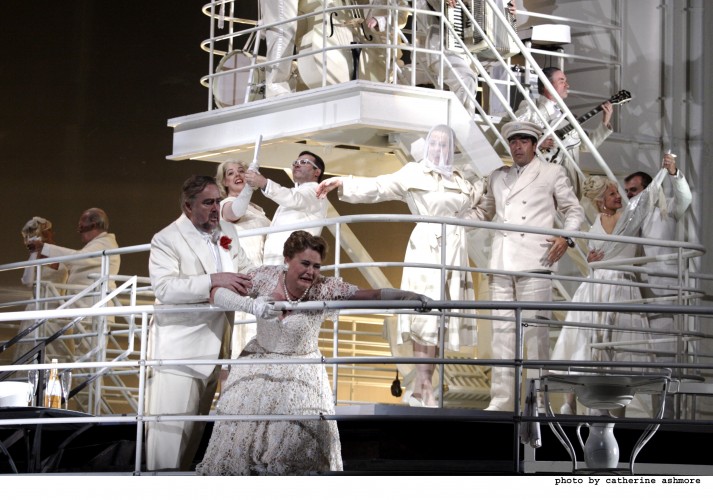 Walter: Your confession moves me very much, however bitter and painful.
Walter: Your confession moves me very much, however bitter and painful.
Liese: All right, I was in Auschwitz
but that does not mean I’m a criminal.
I was an honorable German. I am proud that I did my duty…
I was so frightened that you would abandon me.
Walter: Poor little creature, how you’ve suffered, how it tortured you.
Liese: Must I really feel responsible for the world and all of its suffering?
____________________________________________________________________
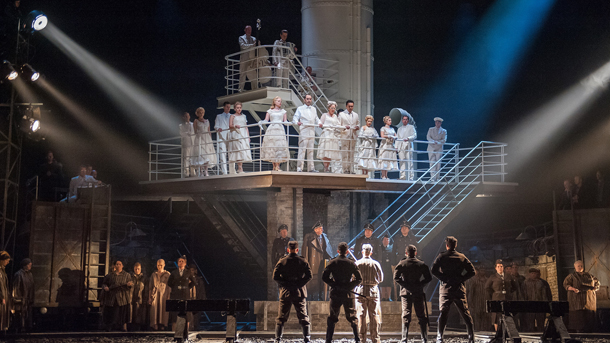
The whiteness above, the blackness below: Tadeuz, a prisoner plays a favored waltz for the S.S. He was Marta’s fiancée. After the concert, he was beaten and sent to his death.
The inexorable pain of the prisoners and its validity is overwhelming, based on what we know, what we have witnessed, make Liese’s plea for exoneration laughable. She takes no responsibility, in fact she tries to confront Marta on the deck:
Liese: I want to hear her thank me for the fact she is living.
Walter: Have you gone mad?
Liese: That she has survived and is here.
Walter: Have you gone mad?
Liese: That she has survived and is here dancing!
_____________________________________________________________
(Marta)
If one day your voices should … if they should fall silent …
if they should fall silent then we are all extinguished.
I hear you: “Do not forgive them, never ever.”Katya, Katuscha, and you Vlasta …
Hannah, Ivette, and you my Tadeuz.
I swear, I swear I will never, I will never forget you.
_______________________________________________________________
The set design is masterful, brilliant. The ship is above angled to the stage, the barracks and watch towers roll and pivot along real rail tracks. Design by Johan Engels.

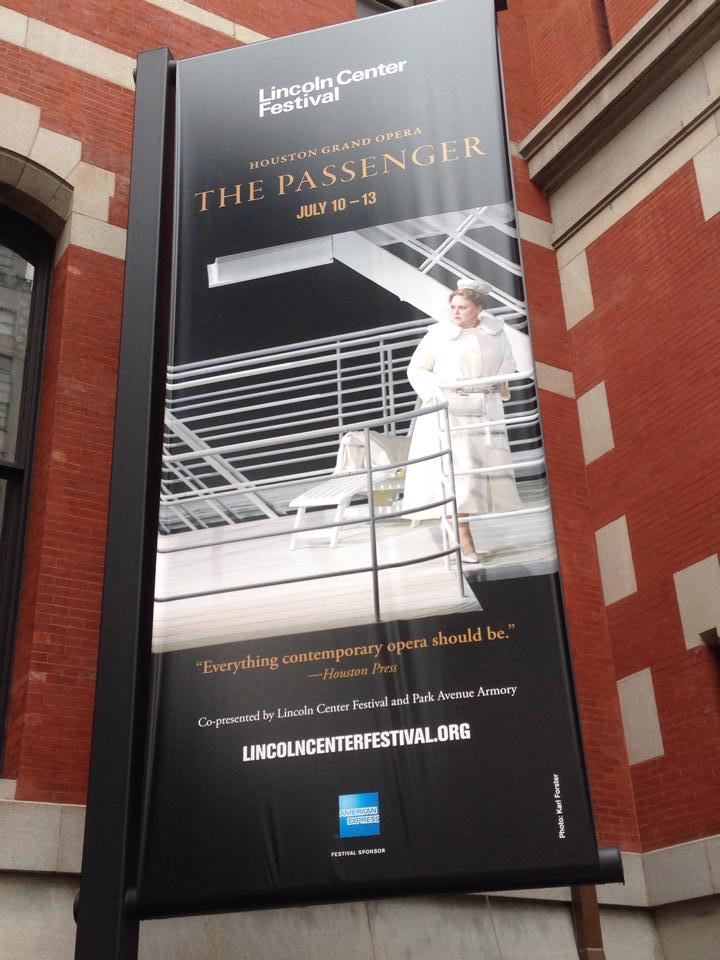
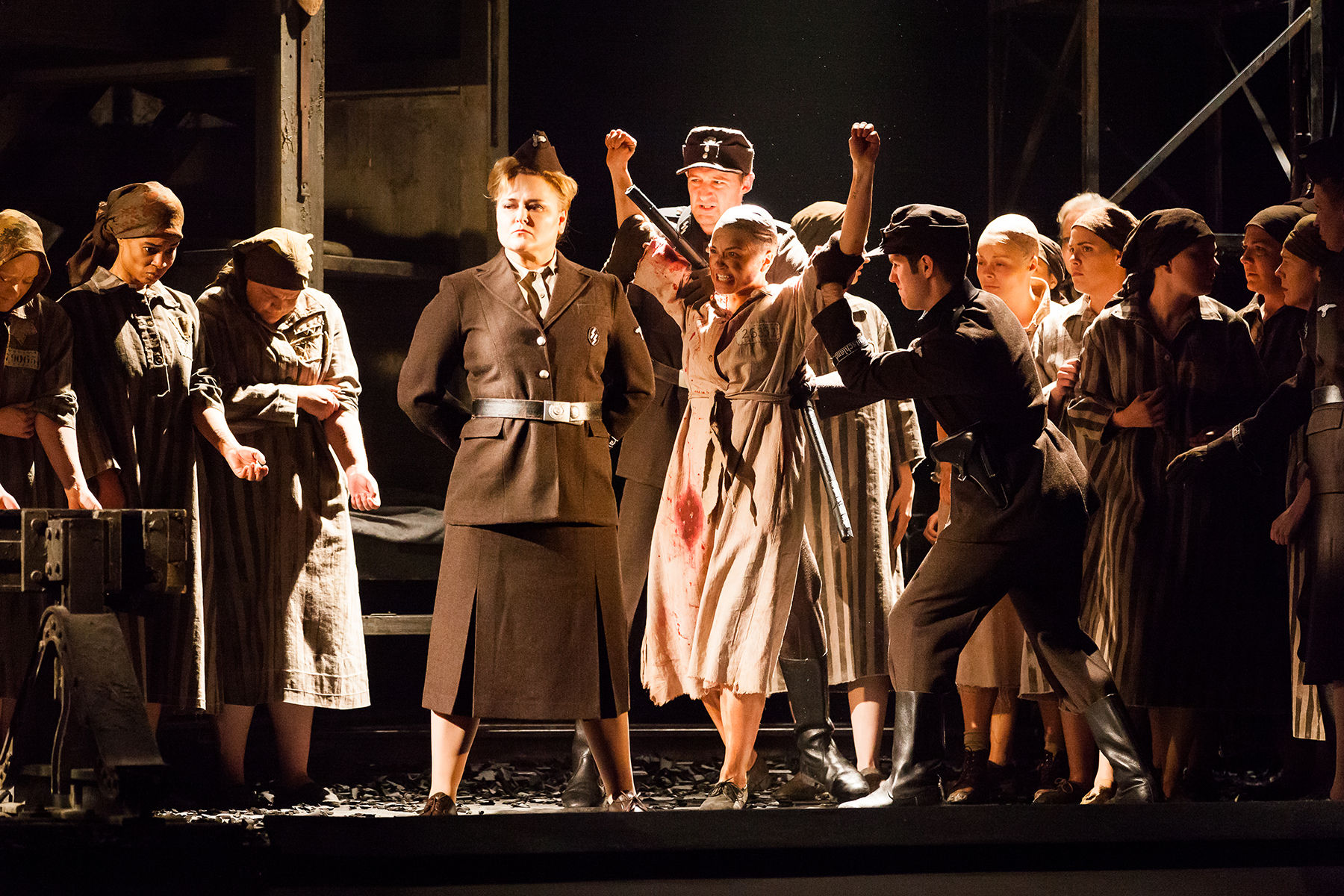
Thanks for sharing this, Sue. I hope to see this opera somewhere in Europe. Your review is captivating.
A touching story about forgiveness:
http://www.bbc.co.uk/news/special/2014/newsspec_8079/index.html
Anon, this truly is a wonderful piece, beautifully written and visually presented. It was indeed, touching.
“When you lose something you will gain something.” Many wonderful quotes within.
I do recall seeing an exhibit at the Smithsonian about the Enola Gay about 15 years ago.
http://airandspace.si.edu/collections/artifact.cfm?object=nasm_A19500100000
http://airandspace.si.edu/exhibitions/enolagay/
This makes me think so much of Russia in the present day. They have allowed themselves to taken over by a dictator who cleverly directs the anger and discontent of the population toward the outside(The West), toward those on the fringe(like GLBTs), and away from himself and his cronies. All their problems are caused by external forces and not by their own government. Exactly what occurred in Germany in the 30’s.
Anon, thanks for coming by and leaving another insightful comment. History just keeps repeating itself, doesn’t it?
Thank you for posting this Sooz. A remarkable piece of work. It is astounding that his has taken this long to get to the stage and to the people.
Roo, thanks for coming all the way from Oz. I’m glad you found it as remarkable as I. The book upon which it was scripted must be amazing too: THE back story.
Just reading this and watching the video gave me the chills. The opera must have been an incredible experience. Thank you for sharing, it must have been somewhat harrowing.
Val, this ranks at the top of most wonderful performances. It wasn’t easy to watch; at times I had to remind myself that it wasn’t “real.” Thanks for coming by.